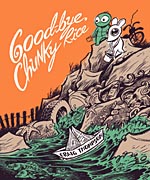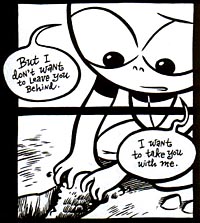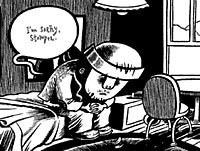
 Writer/Artist: Craig Thompson
Writer/Artist: Craig Thompson
Price: $14.95
Publisher: Top Shelf Productions
ISBN: 1-891830-09-0
I lived at home up until about six months ago, when I moved to Ohio to attend graduate school. I was changing towns, I was changing schools, I was living on my own for the first time in my life and worst of all, I had to leave Doug behind.
Doug was - and remains - my best friend since the third grade. Other friends had come and gone throughout the years, but Doug had been a constant, always around for a quick trip to a Barnes & Noble, a DVD rental or trying to catch a movie sneak preview. It was more than just losing someone to hang out with - it was about losing one of the few people whose mind operated on the same wavelength as mine.
That's the core of friendship, really - the understanding. And trying to find out who you are without that understanding is a quiet kind of pain that everyone goes through, and some never recover from.
Craig Thompson's GOOD-BYE, CHUNKY RICE is about that pain, about the friendships we hold onto, for better or worse. It's not about the events that lead up to the pain of separation, nor the healing from the wound. It's just about that one long, seemingly endless moment after you've realised your life has changed, and you have to deal with what's next.
The book concerns the friendship between the titular character, a small turtle with a fondness for Motown, and Dandel, a wide-eyed mouse who rides a large tricycle. They live in a town by the seaside, a town that Chunky will soon leave. Why is he leaving? Where is he going? No concrete answer is given; it's simply his time to move on, and Dandel must stay behind.
Dandel feels strong, but after Chunky leaves, she finds herself with a hole in her life that she just can't quite fill. She writes letters to Chunky, sticks them in bottles, and throws them out to sea; she has no idea if he'll ever read them, but it's the only way she knows to keep their connection alive.
 Chunky Rice faces a different kind of problem. Not only has he left Dandel behind, but he's on a long journey to a new, strange place, surrounded by people he doesn't know. The other people on board are a feisty married couple and a pair of sisters joined at the head; what do they know about being alone? As the sea churns and a storm brews, Chunky finds himself more threatened by the unknown than by the real danger surrounding him.
Chunky Rice faces a different kind of problem. Not only has he left Dandel behind, but he's on a long journey to a new, strange place, surrounded by people he doesn't know. The other people on board are a feisty married couple and a pair of sisters joined at the head; what do they know about being alone? As the sea churns and a storm brews, Chunky finds himself more threatened by the unknown than by the real danger surrounding him.
Back on land, Chunky's old neighbour Solomon sees the two separated friends as a reflection of his own shattered friendship. When he was a boy, he had a dog named Stomper, who he was made to betray in a manner that still haunts him. Now, Solomon has a new friend, a wounded bird he's nursing back to health named Merle. Can Solomon forgive himself for what he did and accept this new friendship, or is he clinging to the false hope that this could even be a new friendship in the first place?
The characters' problems occasionally overlap, but never intersect; Dandel and Solomon could probably offer one another some comfort, but neither knows of the other's problems. Chunky could identify with Merle, torn between Solomon and his fellow birds, but the two don't even speak the same language, let alone cross paths. Whatever the characters are going through, they must go through alone, and find it within themselves to transcend the pain that cripples them.
The narrative in GOOD-BYE, CHUNKY RICE is in many ways the least important aspect of the book; there is a sense that we are only witnessing a moment in these characters' stories, that they have been going on before the book and will continue afterwards. The sequences have a compressed, dreamlike quality to them; the way events seem when you remember them later, with the important details emphasised.
 GOOD-BYE, CHUNKY RICE was the first graphic novel by Craig Thompson, and the book feels like something that may have happened to him, with turtles and field mice standing in for the real people. The characters speak in sentences that are poetic without sounding silly; a line like, "You're like a little flower that's outgrown its pot," works because it has the ring of sincerity to it, while the book's final line of dialogue, simple as it is, encapsulates its themes in a moment of surprising power.
GOOD-BYE, CHUNKY RICE was the first graphic novel by Craig Thompson, and the book feels like something that may have happened to him, with turtles and field mice standing in for the real people. The characters speak in sentences that are poetic without sounding silly; a line like, "You're like a little flower that's outgrown its pot," works because it has the ring of sincerity to it, while the book's final line of dialogue, simple as it is, encapsulates its themes in a moment of surprising power.
The word "evocative" feels overused in describing comic art, but it fits this book perfectly; even the simplest images have a sense of depth and texture to them, reminiscent of the illustrations in Tove Jansson's Moomin stories. Characters like Solomon and the conjoined sisters are bizarre without being grotesque; their malformed nature reflects their personalities, rather than being included for simple shock value. Chunky and Dandel, despite their simplistic designs, are highly expressive characters as well, able to communicate complex emotions through a simple gesture or wordless stare. Images of the ocean recur throughout the book, echoing the lives of the characters: Churning, uncertain, never still.
Thompson has recently finished his second graphic novel, the autobiographical BLANKETS, which will be published by Top Shelf this summer. Advance reviews indicate that it continues the themes of friendship, innocence and loss found in CHUNKY RICE. Thompson seems to have a willingness to confront the kind of emotions that most people try to repress; he understands that the pain of separation is something that simply exists, neither starting nor ending through some melodramatic event.
In the world of CHUNKY RICE, even the most innocent of characters is not immune to this pain. But, Thompson suggests, it is still possible for individuals to overcome that pain and maintain a meaningful connection with one another. Reading GOOD-BYE, CHUNKY RICE, I thought of my friend Doug, and the times we had, and smiled for reasons I didn't quite understand. And, for a moment, I thought I heard the sound of the ocean.

This article is Ideological Freeware. The author grants permission for its reproduction and redistribution by private individuals on condition that the author and source of the article are clearly shown, no charge is made, and the whole article is reproduced intact, including this notice.


